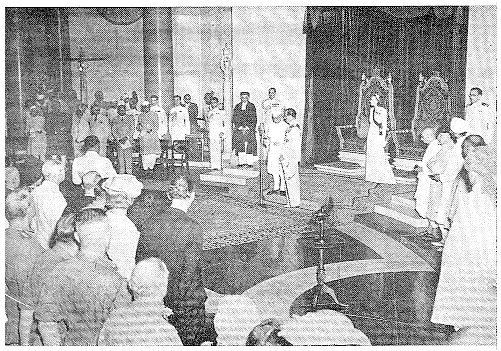| The stage was thus set for the June 3 Plan under which power was to
be transferred by the British to two successor states on August 15, 1947. What Gandhi has
feared had come to pass. India was to be divided, but partition was not being imposed; it
had been accepted by Nehru, Patel and a majority of the Congress leaders. Gandhi had
serious doubts on t6he wisdom of this decision. The very violence, which in the opinion of
his Congress colleagues and that of the British Government provided a compelling motive
for partition was, for him an irresistible argument against it; to accept partition
because of the fear of civil war was to acknowledge that "everything was to be got if
mad violence was perpetrated in sufficient measure" Partitions having become a fait accompli, Gandhi’s efforts from now on were directed to mitigating its risks. He paid brief visits to Kashmir, the Punjab and Bengal. In Calcutta, just before the transfer the transfer of power, his presence had a magical effect; the communal tensions and hatreds of the preceding twelve months vanished almost overnight. When there was a recrudescence of trouble a fortnight later, he went on a fast which electrified the town, moved the Muslims and shamed the Hindus. The leaders of all communities pledged themselves to peace and begged Gandhi to break the fast. The Calcutta fast was rightly acclaimed as a miracle; in the oft-quoted words of the London Times, it did what several divisions of troops could not have done. Gandhi now felt free to turn to the Punjab which was witnessing one of the major migrations of population in history. Seized with fantastic hopes and fears, the villages and town of the Punjab had been dreading, and at the same time, preparing for a battle of the barricades. The administrative paralysis caused by the reshuffling of administrative cadres on a communal basis, and the infection of the police and military with communal virus had, by the end of August, led to a situation in which it was impossible for the Hindu minority to stay in West Punjab and the Muslim minority to stay in the East Punjab.
As the interminable caravans of refugees with their tales of woes crawled to their destinations, violence spread. When Gandhi arrived in Delhi early in September, he found it paralysed by communal tension. The Government, led by Nehru, had acted energetically and impartially. Gandhi was not content with a peace imposed by the police and the military; he wanted violence to be purged form the hearts of Hindus and Muslims. It was an uphill task. Delhi had a number of refugee camps, some of which housed Hindus and Sikhs from West Pakistan, while others sheltered Muslims fleeing from Delhi for a passage across the border. |
